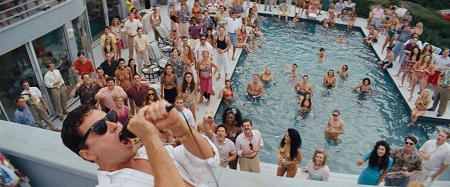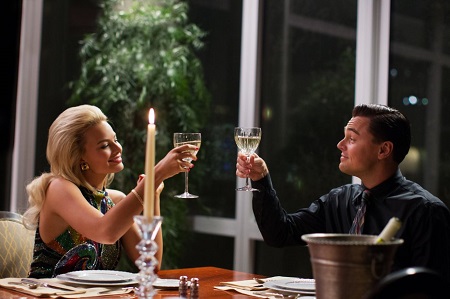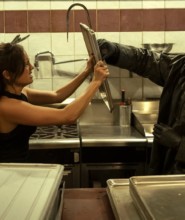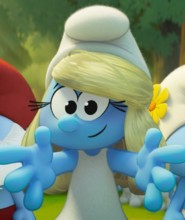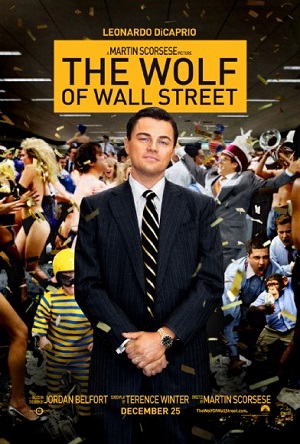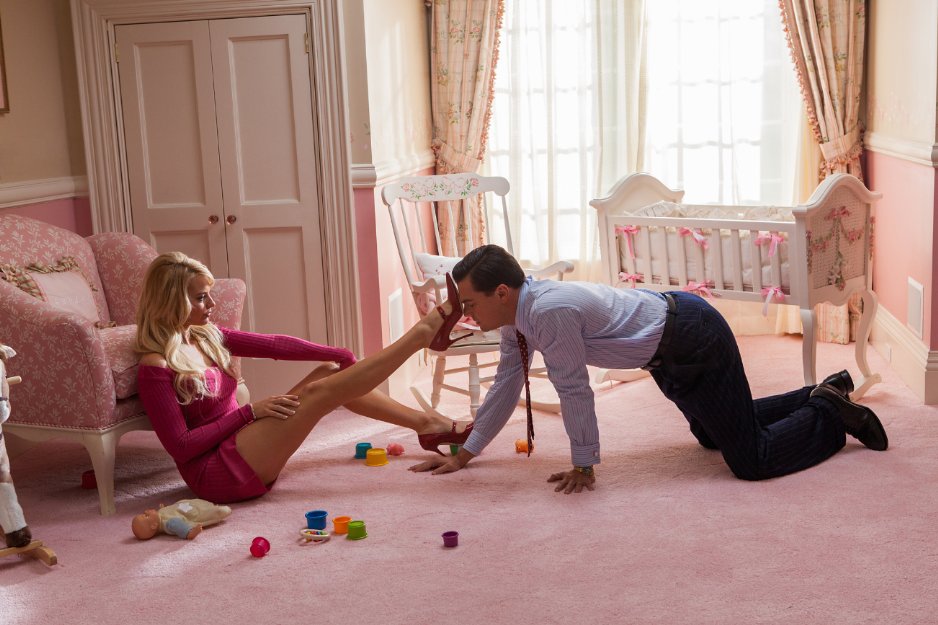
Scorsese’s Wolf a Hungry Tale of Excess and Greed
Jordan Belfort (Leonardo DiCaprio) isn’t inherently a bad man. A working class kid with stars in his eyes and dollar signs clouding his thinking, after his first job as a New York stockbroker doesn’t go to plan the whip-smart salesman finds himself sitting on the bottom of despair unsure the best path forward. Hatching onto a plan involving low-priced stocks and big commissions, he rounds up a group of friends and teaches them how to sell everything and anything, quickly building up a portfolio and a company the envy of all of Wall Street.
But what begins as an attempt to make a better life for himself and his family soon spirals out of control into unimaginable excess. Fueled by drugs, booze and women more than willing to debase themselves at his feet for a handful of cash, Belfort skirts the rules and bends every law he can in the pursuit of more, catching the eye of straight-laced FBI Agent Patrick Denham (Kyle Chandler) in the process.
Based on Belfort’s memoir, Martin Scorsese’s Quaalude-fueled bleakly comic New York financial industry free-for-all The Wolf of Wall Street is a coal black evisceration that’s so in-your-face watching it is akin to a bodily assault. The movie slapped me around, stepped on my hands, kicked me in the stomach and spit in my face, doing so with a kinetic ferocity that was so all-encompassing the cumulative effect was staggering. At a just shy of three hours, the movie isn’t for the faint of heart or spirit, the legendary director playing at a such fevered pace and with such surrealistic brio calling the picture a 180 minute meat grinder wouldn’t be too far off the mark.
Is it entertaining? Yes and no, the full impact of just how heinous the main players are and the real lack of any sort of meaty comeuppance – the point of it all, after all – rightly disconcerting. But the movie is so filled with energy, so enthusiastically crafted and so brilliantly acted by its key players it’s difficult not to be impressed. More than that, though, Scorsese and screenwriter Terrence Winter (Get Rich or Die Tryin’) do a magnificent job of placing the viewer right into the middle of the maelstrom, allowing us to feel what Belfort does making this particular merry-go-round shockingly easy to ride.
DiCaprio throws himself into this with everything he’s got. This is a freewheeling, uninhibited performance freed from constraint. He’s a madman living in the moment doing everything he can to feed an overwhelming need for celebrity and materialistic intemperance falling over the line of decency into nihilistic psychosis. But what makes him magnificent isn’t the fact he’s willing to go wherever Scorsese chooses to lead him but that he’s doing it in total servitude to the story. In lesser hands this could have just been an over-the-top scenery chomping showcase of bluster and bile but in his it is extraordinary, DiCaprio delivering the kind of all-encompassing showcase sure to be dissected, debated and, in some corners, excoriated for many years to come.
As per usual, the rest of the cast Scorsese has assembled is up to the challenge. Jonah Hill has never been better, and that includes his Oscar-nominated turn in Moneyball. He’s Belfort’s best friend, business partner and, in all of the worst ways, his enabler Donnie Azoff, helping him achieve his success just at the same time he unintentionally undermines it with bad decision making skills and a yen for anything he can snort up his nose. Matthew McConaughey, who apparently is no longer capable of choosing a bad role, shows up early on making an indelible imprint as a Wall Street titan who inadvertently sets Belfort on his narcissistic path, stealing every second he appears on screen with an arrogant swagger that’s mesmeric.
The remainder of the supporting players, including Chandler, Jean Dujardin, Joanna Lumley, Shea Whigham, P.J. Byrne, Cristin Milioti and directors Rob Reiner and Jon Favreau all have signature moments that justifiably standout, while former “The Walking Dead” and current Grudge Match scene-stealer Jon Bernthal makes a major imprint every time he steps into the frame. But the real surprise is newcomer Margot Robbie, the young Australian actress crafting a complex and marvelously nuanced performance as Belfort’s second wife Naomi. She’s the only truly sympathetic figure present in this entire saga, and what on the surface appears to be nothing more than a superficial gold-digger turns out to be a humane and caring figure of regret and sadness who sees the good in everyone only to have them let her down time and time again.
The film is long, there’s no getting around that, and there are portions that, while in and of themselves are exceptionally delivered and exceedingly well made, repeat themes and ideas in Winter’s script that are already readily apparent. It can also be said that Scorsese, for all his flash and his flair, isn’t digging as deeply into this morass has he possibly could have, allowing Belfort and his cronies somewhat off the hook in ways that come close to celebrating their more odious character defects (of which there are too many to recount).
But that might just be the point. Showing the zest, flair and abilities of a much younger filmmaker, Scorsese’s willingness to throw convention out with the bathwater isn’t just laudable, its worthy of celebration. It’s as if he’s managed to combine the best attributes of Goodfellas, Casino, After Hours and The King of Comedy into one odd-duck of a cinematic character study, the film treading the line between melodramatic tragedy and pitch black comedic prodigality with superlative ease. His statements about the one percent and their seeming indifference to the rest of the world isn’t revelatory but that doesn’t make them any less necessary, Scorsese keeping his eye on the prize no matter how unwieldy or absurd what’s going on inside the story he’s telling might in fact become.
The Wolf of Wall Street is the kind of movie I feel like I need to watch multiple times in order to get a proper hold of. It’s disgusting central figures and the way it looks at them with such dispassionate clarity is as off-putting and as ugly as it should be, the bad taste building in my mouth as indispensable as it is unexpected. Scorsese’s zestfully anarchic approach is exactly as it should be, the Oscar-winning director proving once again he’s still America’s reigning cinematic poet laureate willing to go places and do things others wouldn’t dream of let alone attempt.
Review reprinted courtesy of the SGN in Seattle
Film Rating: 3½ (out of 4)


